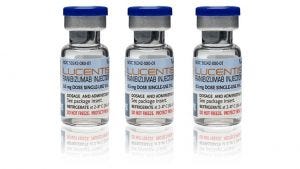
Roche says its Port Delivery System will keep Lucentis (ranibizumab) competitive against upcoming biosimilar competition.
Lucentis pulled in CHF 1.66 billion ($1.66 billion) in US sales for Roche in 2018, up 18% on the year before. The drug is marketed in Europe by fellow Swiss firm Novartis.
The firm attributed the increase to the “ongoing rollout of prefilled syringes and sales increases in all approved indications.” The monoclonal antibody, approved for eye conditions including neovascular (‘wet’) age-related macular degeneration, macular oedema following retinal vein occlusion, diabetic macular oedema, and diabetic retinopathy.

But looking forward, the patents on Lucentis are set to expire in the US in June 2020 and with several ranibizumab biosimilars in the work Roche is likely to see some sales erosion.
“Lucentis will be exposed to biosimilar competition in the coming years,” CEO of Roche Pharmaceuticals, Bill Anderson, said during an end-of-year financial call. Samsung Bioepis, Formycon, Pfenex, Xbrane and Dyadic are among the firms with Lucentis biosimilars in their pipelines.
Port Delivery
“However, in 2018, we showed a major gain in that we demonstrated with the Lucentis device that can be implanted in the eye and can extend the dosing interval from six months to even a year versus the monthly regimen that Lucentis has today.”
The so-called ‘Port Delivery System’ is implanted during a surgical procedure and refilled using a customized needle in a minimally invasive office-based procedure. Genentech presented positive Phase II trial results of the system with ranibizumab in July last year, and a Phase III study comparing using the Port Delivery System with ranibizumab intravitreal injections in participants with neovascular age-related macular degeneration (nAMD) is estimated to be completed by February 2021.
“With the Port Delivery System, there’s a massive potential for benefiting patients and quite an attractive financial opportunity as well,” said Anderson.
“[The Port Delivery System] will not be subject to biosimilar competition because we have the patents around how to do that and how to put it in the device. And so we believe that the Lucentis franchise will be a very important franchise for some time to come for the company, and obviously, a big advance for patients.”
About the Author
You May Also Like

schedl_b_and_w.jpg?width=100&auto=webp&quality=80&disable=upscale)
schedl_b_and_w.jpg?width=400&auto=webp&quality=80&disable=upscale)



